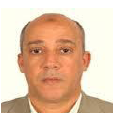
Abdellah El Manouar
Work place: TIME laboratory, ENSIAS Engineering School, Mohammed V University in Rabat, Morocco
E-mail: a.elmanouar@um5s.net.ma
Website:
Research Interests: Business & Economics
Biography
PR. Abdellah EL Manouar is Ph. D Economics; He has obtained diploma of a Bachelor in Economics and Law from University Mohammed V (Rabat, Morocco, 1980), a Master of Economics (Money, Finance and Banking, University of Clermont-Ferrand, France, 1981), a M. Sc. Economics (Money and Macroeconomic policy, Department of Economics, University of Montréal, Canada 1983) and a Ph. D Economics (Macroeconomic and international finance, Department of Economics, University of Montréal, Canada, 1990).He is now a Professor at ENSIAS (University Mohammed V, Rabat, Morocco) where he is teaching courses in economics, finance and electronic management. He accumulated a long teaching experience (almost 30 years) in different institutions (Morocco, Canada and France). PR A. EL Manouar’s research interest covers new economy and ITC economics (Information Economy, digital economy and E-business) and Classical economics (Industrial economy, Macroeconomics and Monetary Theory, Corporate Finance, Economic Relations and International Finance).
Author Articles
IT Innovation and Firm’s Sustainable Performance: The Intermediary Role of Organizational Agility – An Empirical Study
By Mohamed Amine Marhraoui Abdellah El Manouar
DOI: https://doi.org/10.5815/ijieeb.2018.03.01, Pub. Date: 8 May 2018
Both small and large companies are facing tough competition in today’s rapidly changing environment. They should be able to adapt continuously to these changes and to exploit them as opportunities of development. Firms should then innovate in order to gain sustainable advantage, by proposing adequate products and services allowing them to increase market shares and sustain their growth. Disruptive technologies are thus adopted in order to conceive innovative products, to develop a new use of existing products/services or to optimize processes. In this article, we describe our theoretical framework and its main constructs. It presents the direct effect of information technology innovation on economic, social and environmental performance. Moreover, our proposed framework focuses on the intermediary role of organizational agility. In addition, the main findings of our quantitative study based on the analysis of survey data from 103 participants are highlighted. After verifying the validity and reliability of our questionnaire results, the framework’s hypotheses are tested using partial least squares path modeling method.
[...] Read more.Other Articles
Subscribe to receive issue release notifications and newsletters from MECS Press journals